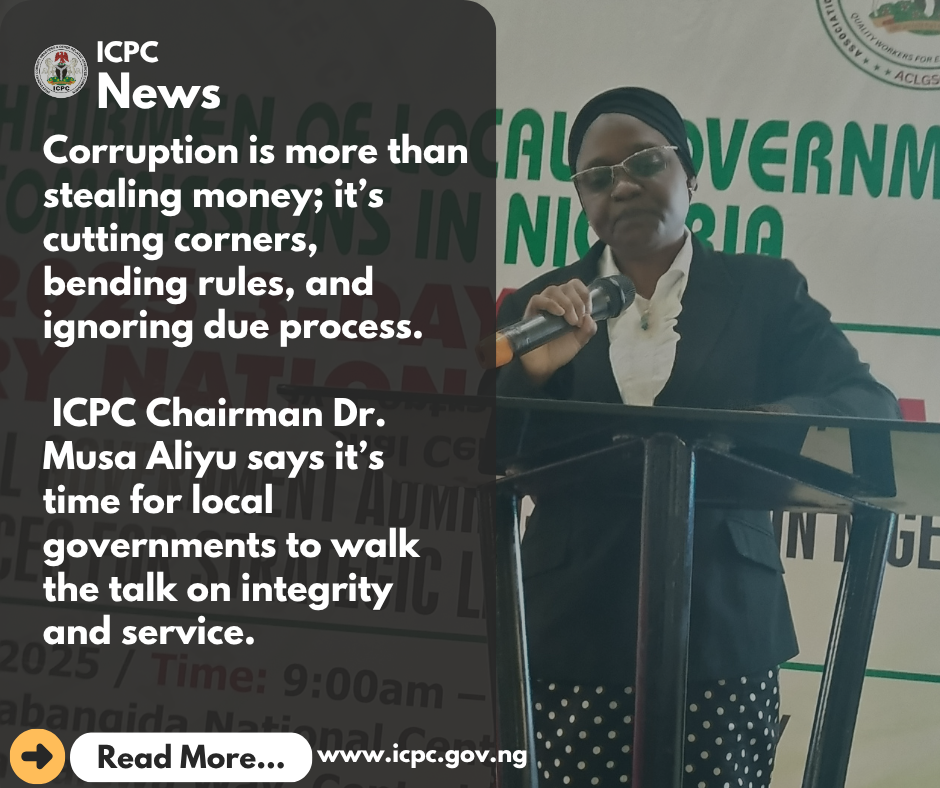The Chairman of the Independent Corrupt Practices and Other Related Offences Commission (ICPC), Dr. Musa Adamu Aliyu, SAN, has emphasized that corruption in Nigeria extends far beyond the act of stealing public funds, describing it instead as “any deviation from the rule or due process.”
Dr. Aliyu made this assertion in Abuja while presenting a paper titled “Understanding Anti-Corruption Laws and Their Implications for Local Government Officials” at the 2025 National Summit of the Association of Chairmen of Local Government Service Commissions in Nigeria.
The summit, themed “Strengthening Local Government Administration in Nigeria,” convened stakeholders from across the country to discuss reforms necessary to enhance governance and accountability at the grassroots level.
The two-day event, held at the Maryam Babangida National Centre for Women Development, brought together local government administrators, policymakers, and anti-corruption experts to explore strategies for effective service delivery at the local level.
Represented by his Special Assistant on Legal Matters, Zainab Nass, the ICPC Chairman observed that corruption is not confined to the public sector alone but exists in every stratum of society including schools, markets, and private institutions.
Citing the World Bank’s definition of corruption as “the abuse of public office for private gain,” Dr. Aliyu noted that corruption encompasses greed, illegality, and any act that subverts due process or denies others their rights.
“Corruption is not just about stealing money; it is anything that deviates from the rule. It is corruption not to follow due process,” he stated.
He urged Nigerians to uphold integrity, transparency, and adherence to the rule of law in all spheres of life, stressing that national development can only be achieved when citizens and institutions act responsibly and lawfully.
Reflecting on Nigeria’s long battle with corruption since independence, Dr. Aliyu recalled several past government initiatives such as the Ethical Revolution, War Against Indiscipline and Corruption (WAIC), and the Mass Mobilization for Self-Reliance, Social Justice and Economic Recovery (MAMSER).
The ICPC Boss explained that these campaigns failed to yield sustainable results due to a lack of legal backing and institutional continuity.
According to him, the decisive turning point came with the establishment of the ICPC under the Corrupt Practices and Other Related Offences Act, 2000, which for the first time provided a comprehensive legal framework to investigate, prevent, and prosecute corruption.
Dr. Aliyu explained that the ICPC’s mandate is anchored on three key pillars enforcement, prevention, and public education and that the Commission has been instrumental in promoting transparency and integrity across public institutions through initiatives such as Corruption Risk Assessments, Systems Studies and Reviews, and the establishment of Anti-Corruption and Transparency Units (ACTUs) in Ministries, Departments, and Agencies (MDAs).
He also highlighted Nigeria’s commitment to global and regional anti-corruption frameworks, including the United Nations Convention Against Corruption (UNCAC), the Financial Action Task Force (FATF) Standards, and the African Union Convention on Preventing and Combating Corruption (AUCPCC), to which the country is a signatory.
Addressing the responsibilities of local government officials, the ICPC Chairman reminded them that all public servants whether elected or appointed—are legally bound to maintain ethical conduct, transparency, and accountability in their duties.
He cautioned that administrative misconducts such as financial misappropriation, falsification of records, nepotism, and abuse of office now attract serious criminal penalties under Nigeria’s anti-corruption laws.
Dr. Aliyu further drew attention to the landmark Supreme Court judgment in Attorney-General of the Federation v. Attorney-Generals of Abia State & 35 Others (2024), which declared unconstitutional the dissolution of democratically elected local government councils by state governors.
He noted that the ruling reaffirmed the constitutional autonomy of local governments and their entitlement to direct allocations from the Federation Account, describing it as “a new dawn for grassroots governance.”
“We are now in the regime of asset recovery taking back what was taken. Local governments must ensure that public funds serve the people, not private interests,” he stated.
Dr. Aliyu, who concluded by calling for renewed commitment to integrity, probity, and effective service delivery at the local government level, emphasized that true national development depends on how efficiently local councils utilize public resources to enhance the welfare of citizens and promote inclusive growth at the grassroots level.


